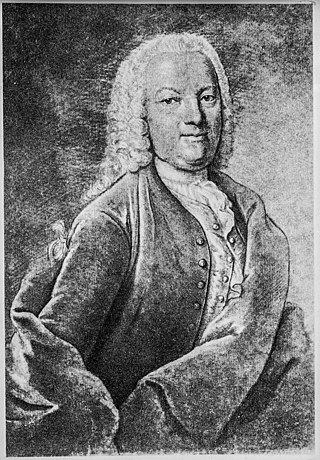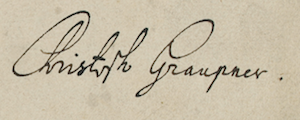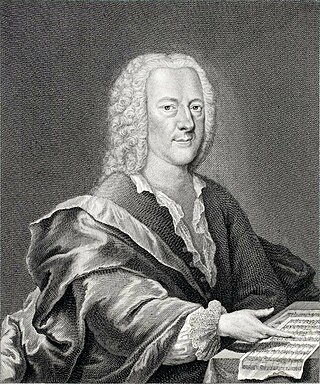Related Research Articles

Johann Georg Pisendel was a German Baroque violinist and composer who, for many years, led the Court Orchestra in Dresden as concertmaster, then the finest instrumental ensemble in Europe. He was the leading violinist of his time, and composers such as Tomaso Albinoni, Georg Philipp Telemann and Antonio Vivaldi all dedicated violin compositions to him.

Christoph Graupner was a German composer and harpsichordist of late Baroque music who was a contemporary of Johann Sebastian Bach, Georg Philipp Telemann and George Frideric Handel.

Akademie für Alte Musik Berlin is a German chamber orchestra founded in East Berlin in 1982. Each year Akamus gives approximately 100 concerts, ranging from small chamber works to large-scale symphonic pieces in Europe's musical centers as well as on tours in Asia, North America and South America.

Ludwig Güttler is an internationally known German virtuoso on the Baroque trumpet, the piccolo trumpet and the corno da caccia. As a conductor, he founded several ensembles including the chamber orchestra Virtuosi Saxoniae. His name is sometimes written in English as Ludwig Guttler.

Hamburger Admiralitätsmusik TWV 24:1 is a secular oratorio for soloists, choir and orchestra composed by Georg Philipp Telemann to celebrate the 100th anniversary of Hamburg's admiralty. It was first performed on April 6, 1723, along with Telemann's Wassermusik at a banquet for the city's merchants, sea captains, and councillors that lasted until dawn. The work is on a nautical theme and set to verses by Michael Richey, a professor at the Johanneum school in Hamburg where Telemann also taught.
New Collegium is a baroque orchestra and chamber ensemble based in The Netherlands. The orchestra was founded in 2006 by Brazilian/Italian harpsichordist Claudio Ribeiro.

Johann Ernst of Saxe-Weimar was a German prince, son by his second marriage of Johann Ernst III, Duke of Saxe-Weimar. Despite his early death he is remembered as a collector and commissioner of music and as a composer, some of whose concertos were arranged for harpsichord or organ by Johann Sebastian Bach, who was court organist in Weimar at the time.
Dorothee Mields is a German soprano concert singer of Baroque and contemporary music.
Ludger Rémy was a German harpsichordist, conductor and musicologist.

Jan Kobow is a German classical tenor in concert, Lied, and Baroque opera.

Elisabeth Scholl is a German soprano and academic teacher.
Dorothee Oberlinger is a German recorder player and professor.
Tatjana Masurenko is a German violist of Russian descent.
Matthias Bäcker is a German oboist and university teacher.
Matthias Sannemüller is a German violist.
Pauline Sachse is a German violist, chamber musician, and professor at the Hochschule für Musik und Theather Felix Mendelssohn Bartholdy.
Cornelia Osterwald is a German harpsichordist and docent for early music.
Kolja Lessing is a German violinist, pianist, composer and academic teacher. His focus as a soloist and chamber musician has been the neglected repertoire by composers who were ostracised under the Nazi regime. His recordings include four volumes of works by students of Franz Schreker in his master classes in Vienna and Berlin.
The Chursächsische Capelle Leipzig is a chamber orchestra founded in Saxony in 1994 by Anne Schumann.
Gelobet sei der Herr täglich is a church cantata by Philipp Heinrich Erlebach, for four voices, strings and continuo. The first movement is based on Psalm 68:20. Erlebach structured the composition in six movements, with the last movement repeating the first. The work is extant as a manuscript from around 1710. It has been recorded and performed.
References
- ↑ "Anne Schumann - Barockgeigerin - English Baroque Soloists und Orchestre Revolutionaire et Romantique". www.anneschumann.info.
- ↑ "Anne Schumann - Barockgeigerin - Biografie". www.anneschumann.info.
- ↑ "Anne Schumann - Barockgeigerin - Ensembles". www.anneschumann.info.
- ↑ "Geigerin bekommt Fasch-Preis 2019". rtl.de.
- ↑ "DVD info" (PDF). www.anneschumann.info. Retrieved 2020-06-11.